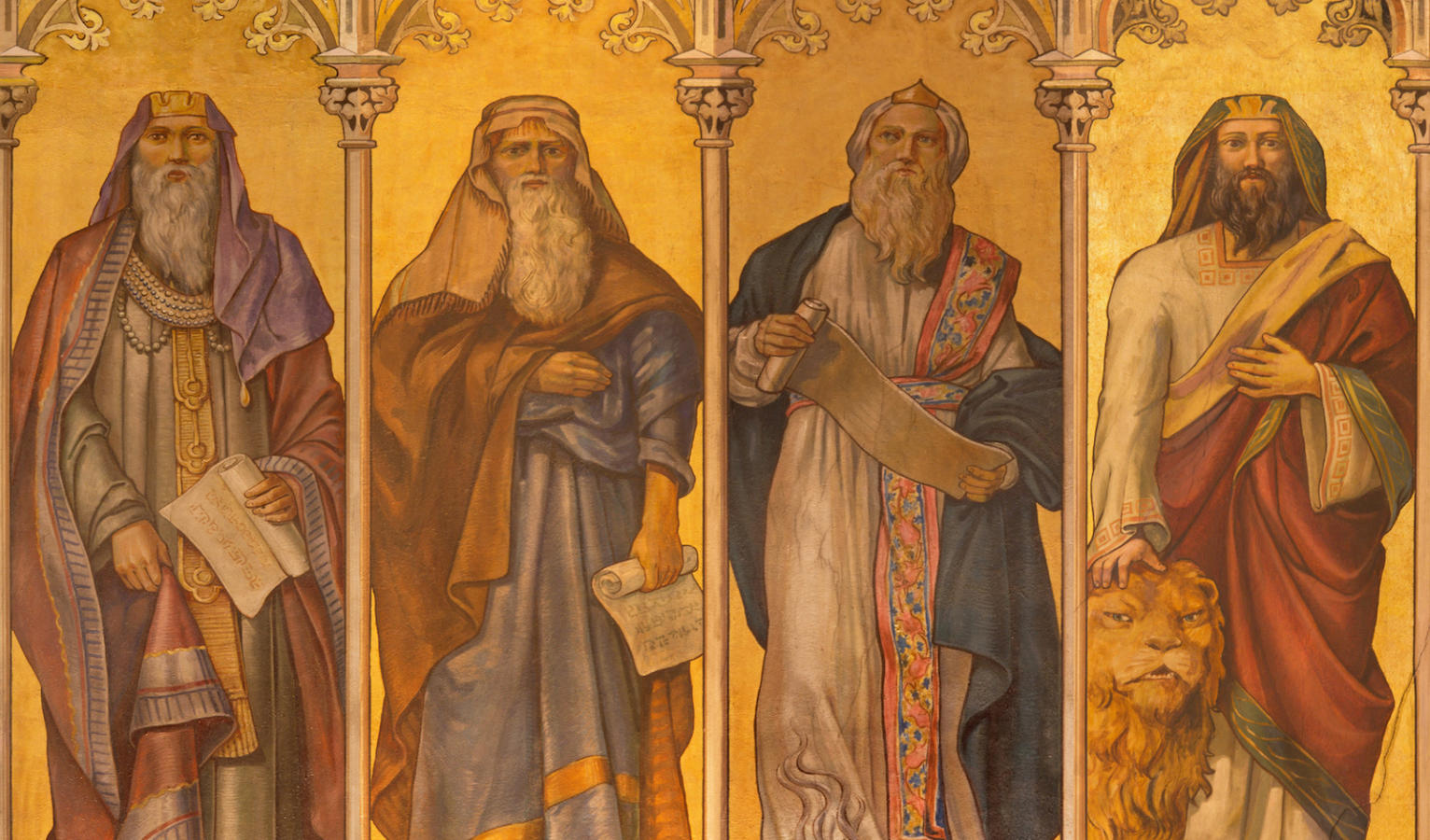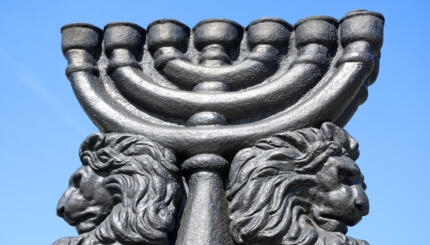The Book of Ezekiel has always been a problem book. As early as the second century C.E., in the time of the Mishnah, there were doubts and concern about it. These doubts were strong enough, in those early days, to raise the question of whether Ezekiel should be one of the biblical books. The Talmud (Sabbath 13b) relates that Hananiah ben Hezekiah (one of the teachers of the Mishnah, who lived about the year 70) used up three hundred measures of oil (to study by) in order to harmonize the laws in Ezekiel with those given in the Torah. If not for this effort, some believed, the book would have been kept out of the Bible. The phrase used was: “The Book of Ezekiel would have been hidden away” (nignaz Sefer Yehezkel).
Read Ezekiel in Hebrew and English on Sefaria.
The rabbis were greatly troubled by the fact that the Book of Ezekiel gives certain laws, chiefly as to the Temple procedures, which actually contradict the laws given in the Book of Leviticus. They had a further objection: The opening chapters (chapters 1-3) of the Book of Ezekiel present a detailed picture of God coming in a chariot, surrounded by retinues of angels, etc. This picture, called “the arrangement of the chariot” (ma’aseh merkavah), became the starting point of special mystical studies. Though deemed important by the rabbis, such studies were considered dangerous for the uninitiated, and therefore the rabbis said that these chapters should not be studied, except by the learned few (Mishnah Hagigah 2: 1). How, then, could they permit such a book to be part of the Bible, to be read by anyone?
These legal and mystical objections of the rabbis were ultimately not deemed sufficient grounds for excluding the Book of Ezekiel from the Bible. Evidently the rabbis held the Book of Ezekiel to be authentic. Hence, they felt, it was an inspired prophecy, properly belonging in the Bible, and its difficulties were difficulties which could be resolved.
With your help, My Jewish Learning can provide endless opportunities for learning, connection and discovery.
Ezekiel: A Return to Ecstasy
What bewilders and disturbs modern scholars about the book is, in a way, analogous to what puzzled the rabbis in talmudic times. The book certainly does differ from the Torah, but modern scholarship is not troubled so much by this as by the fact that, because Ezekiel is so different from the other prophets, the scholarly conclusions and consensus derived from studies of Amos, Hosea, Isaiah, and Jeremiah do not seem to apply to him at all.
The great literary prophets themselves differed greatly from the schools and bands of prophets that preceded them in Israelite history. The earlier prophets were ecstatics (such as those Saul joined, and was moved to prophesy with, upon leaving Samuel–1 Samuel 10:9-10). Here the word “prophesy” does not mean that Saul made some great and meaningful utterance, but simply that he spoke words which came out of him in his semitrance.
The literary prophets (besides Ezekiel) did not need mass hypnosis of a band or school of prophets. They spoke with passion, indeed, but a passion born of conviction. Ezekiel, like the literary prophets, teaches high ethical ideals, often in a poetic and eloquent manner; but he also falls into trances, struck dumb sometimes for days, unable to speak. He sees grandiose, multiform visions. He is a literary prophet like Isaiah and Amos, but he is also an ecstatic prophet, a reversion to an older time.
A New Focus on the Individual
There is another difference. The other prophets always addressed the nation as a whole, denouncing it for social sins, calling upon it to achieve social justice. Ezekiel, like the literary prophets, also addressed the nation, but in addition he developed a new doctrine of personal responsibility for right and wrong. This, by the way, was one of the contradictions which the rabbis found between Ezekiel and the Torah. Moses said “…visiting the sins of the fathers upon the children” (Exodus 20:5), and Ezekiel said that children shall not be punished for the sins of the fathers–“only the soul that sinneth, it shall die” (Ezekiel 18). Ezekiel resembled the literary prophets in that the nation was his audience, but he differed from them in that the individual too became his audience.
A Greater Emphasis on the Temple
Finally, while it may still be disputed whether the great literary prophets completely opposed the ritual observances of the Temple‑-the sacrifices, the incense‑-there is no doubt that they gave it a secondary place in the order of man’s duties: “Wherewith shall I come before the Lord … with burnt‑offerings?…It hath been told thee, 0 man, what is good … to do justly, to love mercy, and to walk humbly with thy God.” (Micah 6:6, 8). These words of Micah were typical of all the great literary prophets. Social ethics and monotheism were the cardinal virtues for the literary prophets.
While Ezekiel preached ethical living, he also laid great emphasis on the ritual. The whole second half of his book, from chapter 40 on, is a description of the Temple that will be built after the restoration and the details of the duties of the priests and the sacrifices which should be offered. It is inconceivable that Amos or Isaiah would have recorded such a picture of the future.
Ezekiel’s Career
Very few details of Ezekiel’s life are known, since the Book of Ezekiel contains only a few references of a biographical nature. We are told that he was a priest, the son of Buzi, and evidently a member of the Zadok family of priests who were in charge of the sanctuary in Jerusalem (1: 3). Nebuchadnezzar, king of Babylon, first captured Jerusalem in 597 B.C.E. and carried off King Jehoiachin and the leaders of the people to Babylon (11 Kings 24: 14). Ezekiel was one of those who were led away in the first captivity, and he dates his book from the years after the exile of Jehoiachin.
In Babylon Ezekiel lived in the city of Tel Aviv on the Chebar Canal. He was married and widowed (24: 16‑18), and he preached his sermons in the exile. The last date in the book is the twenty‑seventh year of his exile, and therefore he preached for twenty‑two years.
Ezekiel was revered by subsequent generations. The traditional tomb of Ezekiel was a shrine for many centuries. Further evidence of his importance to succeeding generations is the frequency with which sections of his book are used as prophetical readings in the synagogue. In spite of the fact that the Mishnah specifically forbids the public reading of two sections of Ezekiel (Megillah 4: 10), there are ten prophetic readings from Ezekiel.
That Ezekiel was chosen so frequently for prophetical reading seems somewhat strange, considering the doubts the rabbis had about the book because of the laws in it which seem to contradict the analogous laws in the Torah and also because of their feeling that the mystical portions of the chariot had to be kept from public reading.
A Powerful Union of Priestly and Prophetic
It would seem that Ezekiel came to occupy so large a place in the synagogue service precisely because of the characteristics that awakened Wellhausen’s scorn [Wellhausen was an early source-critical scholar, who maintained the rather anti-Jewish conviction that Judaism had been “corrupted” by the “dead” ritual of the priestly system, which he considered to be a late development -Ed] and led him to say that Ezekiel was really only a priest in prophetic clothing. All the great literary prophets before Ezekiel had a negative attitude toward the Temple and its ritual, and this fact gave rise to the popular sermonic phrase, “priest versus prophet,” which implies that we must make a choice‑following either the priest or the prophet, believing either in ritual or in righteousness.
Ezekiel indicates that such an opposition between ritual and righteousness is unrealistic. As far as he was concerned, the true worship of God involved both the prophetic emphasis on social justice and the priestly ritual observed in the sacred Temple. He emphasized both in his book, combining the drama of ceremony and the dedication of ethics. This dual emphasis exerted a powerful influence on Jewish history.
Judaism followed Ezekiel. It did not become a pure ethical system, following the prophets alone, or a mechanical ritual system, following the priests. Judaism became, as Ezekiel meant it to be, a pageant of ceremony ennobled by prophetic idealism.
Because it was Ezekiel who pioneered the principle that ritual and righteousness need not compete for the soul of the true worshiper of God, and that priest and prophet can teach together, one may well say that he, more than any other, was responsible for the fact that at every Jewish public worship service, on every Sabbath and holiday, a reading from the prophets always follows the reading from the Torah. This liturgical practice helped ensure that the words of the great literary prophets were taken into the heart of Judaism and preserved for succeeding generations.
“Father” of Jewish Mysticism
Furthermore, Ezekiel’s strange, mystical mood, which made him see those elaborate and magnificent visions of the heavenly chariot, became the basis for Jewish mystical studies which later developed into the Kabbalah. When we consider the vast influence of the Kabbalah all through Jewish history, one may perhaps say that Ezekiel, whose words were the soil in which it grew, was certainly the most influential, if not necessarily the grandest, of all the literary prophets.
This article is excerpted with permission from Book of Ezekiel: A Commentary.
Kabbalah
Pronounced: kah-bah-LAH, sometimes kuh-BAHL-uh, Origin: Hebrew, Jewish mysticism.
Mishnah
Pronounced: MISH-nuh, Origin: Hebrew, code of Jewish law compiled in the first centuries of the Common Era. Together with the Gemara, it makes up the Talmud.
Talmud
Pronounced: TALL-mud, Origin: Hebrew, the set of teachings and commentaries on the Torah that form the basis for Jewish law. Comprised of the Mishnah and the Gemara, it contains the opinions of thousands of rabbis from different periods in Jewish history.
Torah
Pronunced: TORE-uh, Origin: Hebrew, the Five Books of Moses.



